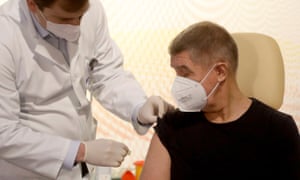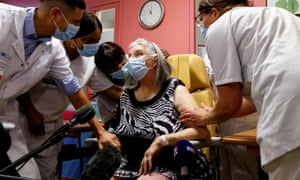
The EU has officially launched its programme of mass vaccination against Covid-19, with the goal of making shots available to all its adult population by the end of 2021.
Meanwhile cases of the new coronavirus variant first detected in the UK were confirmed in at least eight European countries, piling further pressure on the vaccine campaign to help get the pandemic under control.
In Italy, the first doses of the Pfizer/BioNTech vaccine were given shortly before 7am on Sunday to a researcher, a nurse and a social health worker at Rome’s Spallanzani infectious diseases hospital.
“It is with deep pride and a deep sense of responsibility that I got the vaccine today. A small gesture but a fundamental gesture for all of us,” said a 29-year-old nurse, Claudia Alivernini, the first to receive the vaccination on Sunday morning. “It is the beginning of the end and I hope to be the first of over 60 millions of Italians … it was an exciting, historical moment.”

The first shipment of 9,750 coronavirus vaccines arrived in Italy, the EU country worst hit by the pandemic with 71,000 dead, on 25 December from Puurs in Belgium.
“Italy is waking up today,” said the prime minister, Giuseppe Conte. “This day will remain in our memory for ever.”
On Thursday, the total number of coronavirus cases recorded in Italy passed the 2m mark.
A 96-year-old living in a care home became the first person in Spain to receive the Covid-19 vaccination.
“Let’s see if we can get rid of this virus,” Araceli Rosario Hidalgo told reporters who had gathered at her care home in the central Spanish city of Guadalajara – chosen as it sits near a Pfizer storage depot – adding that she had felt “nothing” from the shot.
The vaccination, broadcast live on television, offered a moment of hope in a country also hit hard by the virus. Spain has confirmed 1,854,951 cases of the virus and at least 49,824 deaths.
A worker at the home, Mónica Tapias, became the second person in the country to receive the vaccine, followed by residents of the care home.
In Malta, a nurse was the first to be immunised, while in Croatia the prime minister congratulated 81-year-old care home resident Branka Aničić on becoming the first in the country to get the vaccine. “I’m happy I will now be able to see my great-grandchildren,” said Aničić.
In a video on her Twitter account, the European commission president, Ursula von der Leyen, described the start of the campaign as a “touching moment of unity and a European success story” and said the EU had “secured enough doses for our whole population of 450 million people”.
Ursula von der Leyen
(@vonderleyen)Today, we start turning the page on a difficult year. The #COVID19 vaccine has been delivered to all EU countries.
Vaccination will begin tomorrow across the EU.
The #EUvaccinationdays are a touching moment of unity. Vaccination is the lasting way out of the pandemic. pic.twitter.com/pYOj5vS2gV
With surveys pointing to high levels of hesitancy towards the vaccine in countries from France to Poland, leaders of the 27-country EU are promoting it as the best chance of getting back to something like normal life next year. “We are starting to turn the page on a difficult year,” said Von der Leyen. “Vaccination is the lasting way out of the pandemic.”
Greece has also begun its vaccination program with the country’s head of state, Katerina Sakellaropoulou, and the prime minister, Kyriakos Mitsotakis, being among the first to get the shot.
In a nation where conspiracy theories over the merits of any vaccine have been rife, Athens’ political elite have gone out of their way to lead by example.
Sakellaropoulou, the nation’s first female president, urged all Greeks to participate in the immunisation program.
“It is important that as many as possible are vaccinated,” she said after her own vaccination at Athens’ Evangelismos hospital was broadcast live on TV. “The time has come to emerge victorious, to put this ordeal behind us, to take back our lives, to gain our freedom and to meet again.”
In a sign of impatience, some EU countries began vaccinating on Saturday, a day before the official start, with a 101-year-old woman in a care home becoming the first person in Germany to be vaccinated, while Hungary and Slovakia also began giving out their first shots.
The Pfizer/BioNTech Covid jab is an mRNA vaccine. Essentially, mRNA is a molecule used by living cells to turn the gene sequences in DNA into the proteins that are the building blocks of all their fundamental structures. A segment of DNA gets copied (“transcribed”) into a piece of mRNA, which in turn gets “read” by the cell’s tools for synthesising proteins.
In the case of an mRNA vaccine, the virus’s mRNA is injected into the muscle, and our own cells then read it and synthesise the viral protein. The immune system reacts to these proteins – which can’t by themselves cause disease – just as if they’d been carried in on the whole virus. This generates a protective response that, studies suggest, lasts for some time.
The two first Covid-19 vaccines to announce phase 3 three trial results were mRNA-based. They were first off the blocks because, as soon as the genetic code of Sars-CoV-2 was known – it was published by the Chinese in January 2020 – companies that had been working on this technology were able to start producing the virus’s mRNA. Making conventional vaccines takes much longer.
Adam Finn, professor of paediatrics at the Bristol Children’s Vaccine Centre, University of Bristol
“We don’t want to waste that one day that the vaccine loses shelf life. We want to use it right away,” Karsten Fischer, from the pandemic staff of the Harz district in the German state of Saxony-Anhalt, told local broadcaster MDR.
Countries are also showing different strategies in their vaccination targeting, with Italy focusing on health workers, France elderly people, and in the Czech Republic the prime minister was at the front of the queue.
The PM, Andrej Babiš, said he was taking the vaccine immediately because “yesterday evening I saw a lady in the news on a TV channel saying she would wait for Babiš”.

France began its campaign in two care homes in the Paris suburb of Seine-Saint-Denis, a low-income area hard hit by Covid-19, AFP has reported.
A 78-year-old former domestic worker, who gave her name as Mauricette, said she was moved when she received the first vaccination outside tests in the country. Staff around her in the René-Muret hospital in the Paris suburb of Sevran broke into applause.
Focusing its strategy on elderly people, Paris is aiming to vaccinate 1 million of the most vulnerable by the end of February and 15 million people by the summer. “We have a new weapon against the virus – the vaccine,” tweeted President Emmanuel Macron.
On Friday, hours before the first doses arrived in France, the country’s health ministry confirmed it had detected its first case of the new variant in a citizen returned from Britain.

Cases of the variant first detected in the UK have been confirmed across Europe including in France, Spain, Denmark, Italy, Iceland, Switzerland, Sweden and the Netherlands, as well as in Australia, Japan and Lebanon.
China, Russia, Canada, the US, Switzerland, Serbia, Singapore and Saudi Arabia have also begun vaccination campaigns.
Britain, which last week finalised a deal on leaving the EU, began its vaccination campaign amid much fanfare on 8 December, three weeks ahead of its former partners.
The distribution of the Pfizer/BioNTech shot presents tough challenges. The vaccine uses new mRNA technology and must be stored at ultra-low temperatures of about -70C (-94F).
Vaccines other than the Pfizer/BioNTech jab are also in the pipeline, and the US, where more than a million people have already been vaccinated, last week began jabs with the vaccine developed by the US biotech firm Moderna.
Meanwhile the University of Oxford and drug manufacturer AstraZeneca have applied to UK authorities seeking the green light for their Covid-19 vaccine.


